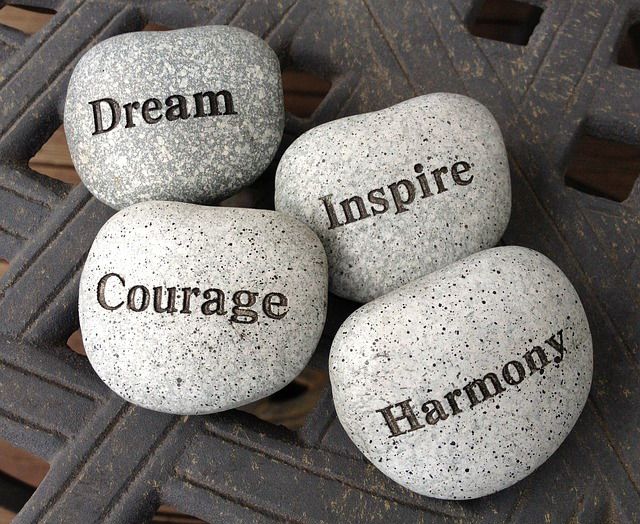 Remember those little cartoon angles and devils that would sit on people’s shoulders whispering into their ears? The devil would sit on one side and urge the person to do all sorts of things that were “bad” and likely to get them into trouble. While the angel would sit on the other shoulder and warn the person against taking the course of action suggested by the devil, or perhaps suggesting the person do some good deed.
Remember those little cartoon angles and devils that would sit on people’s shoulders whispering into their ears? The devil would sit on one side and urge the person to do all sorts of things that were “bad” and likely to get them into trouble. While the angel would sit on the other shoulder and warn the person against taking the course of action suggested by the devil, or perhaps suggesting the person do some good deed.This image was very popular back in the 50’s and 60’s because people could relate to it. We hadn’t become the psychologically sophisticated society we are today that understands what these angels really are. But the image feels very real to the average person because they do hear these little inner voices from different parts of themselves urging them in different directions. For someone raised in a moral or religious environment, the inner battle between the “good” and the “bad” sides of themselves is a very real and daily concern.

The modern spiritual movement has done nothing to change this inner battle except to give the voices different names. People have been facing this battle for thousands of years and have developed many different techniques for dealing with this inner conflict. This is one of the basic touchstones of the world of philosophy. But strangely, each generation seems to forget the skills developed by the previous generations. Everyone tries to figure out how to handle this challenge on their own with very little actual skill-teaching coming from their religious or philosophical leaders. Everyone says to be “good” and not “bad” without telling you how to achieve this outcome. At best, society tries to stamp out the “bad” with negative consequences under the theory that you can scare or beat the “bad” out of someone.
Suppression of the negative never works long term. It simply goes underground and bursts out at a later date. Classic examples of colossal failures are our “War on Drugs,” our “War on Cancer,” our “War on Crime” et cetera. You can not fight negativity with more negativity.

Once you understand that the “Devil” we are all fighting is really just our immature inner self still trying to get our needs met through immature methods, then we come to understand that the battle is not a battle at all, but an educational process. Everyone wants to feel safe and protected, and that his or her physical survival and belongingness/connection needs will be met. When we are really young most of us are granted a grace period where these needs are met “for free” – just because we exist. The expectation is that we will learn what we have to do to earn getting these needs met as we grow up. The problem is that getting these needs met in a positive, respectful, mutually sustainable manner requires a tremendous amount of skill. Most people settle for getting their needs partially met through less positive means that require less skill. Plus there are lots of ways to scam the system short term to get survival needs met that are down right negative such as intimidation, playing the “I’m not ok” game, or the “victim” game.
 When you get your needs met through positive, respectful, and mutually sustainable means, you build bonds of connection and belonging that you can freely let into your heart because you feel the genuine authenticity that a mutually respectful relationship creates. When you scam the system your heart is closed because you can feel that the relationship is fake because you are a fake. This generally feels really bad, so such people generally use substances to numb their feelings or take on attitudes like anger to dissociate from these feelings.
When you get your needs met through positive, respectful, and mutually sustainable means, you build bonds of connection and belonging that you can freely let into your heart because you feel the genuine authenticity that a mutually respectful relationship creates. When you scam the system your heart is closed because you can feel that the relationship is fake because you are a fake. This generally feels really bad, so such people generally use substances to numb their feelings or take on attitudes like anger to dissociate from these feelings.So how do you train that little devil to become an angel? The most basic step is to understand what these feeds these two sides. The recent movie Tomorrowland highlighted this step in the story of the two wolves.
“Outside your door there are two wolves always  fighting with each other. One wolf is full of darkness and despair, while the other wolf is filled with lightness and hope. The question is which one will win the fight? The answer is whichever one you feed.”
fighting with each other. One wolf is full of darkness and despair, while the other wolf is filled with lightness and hope. The question is which one will win the fight? The answer is whichever one you feed.”
 fighting with each other. One wolf is full of darkness and despair, while the other wolf is filled with lightness and hope. The question is which one will win the fight? The answer is whichever one you feed.”
fighting with each other. One wolf is full of darkness and despair, while the other wolf is filled with lightness and hope. The question is which one will win the fight? The answer is whichever one you feed.” The devil and angel sides to you thrive on attention and emotion. This is how the brain learns and grows. The more attention and emotion we put into a given direction, the more the brain grows to bring that point of attention into fruition. Notice that both focused attention and directed emotion are required to be effective. Just mental focus alone without passion has little effect. Passion that is scattered and unfocused is likewise ineffective. You need both to get the job done. This is true for learning any skill – from a language to surfing, from computer programming to cooking. You have to pay attention and you have to want to pay attention.
 Techniques for focusing attention on the higher more spiritual side of life have been around for thousands of years. Prayer beads, rituals, mantras, sacred writings, hymns, meditations, and so on have been used forever to focus the attention on higher spiritual states of consciousness. But by themselves they work very slowly if at all if there is no motivated passion driving the attention.
Techniques for focusing attention on the higher more spiritual side of life have been around for thousands of years. Prayer beads, rituals, mantras, sacred writings, hymns, meditations, and so on have been used forever to focus the attention on higher spiritual states of consciousness. But by themselves they work very slowly if at all if there is no motivated passion driving the attention.What brings the passion to our attention? Unfortunately the biggest driver of passion is suffering. It is the negative consequences of our immature attempts to get our needs met that produces the pain and suffering which motivates most people to grow up. Why else would you apply tons of effort to learn new skills if your present skills left you perfectly happy? You wouldn’t apply that kind of effort unless you wanted outcomes that made you happier. Different outcomes result from different skills being applied in your relationships with life.
 The big challenge is to not let the negative consequences and suffering discourage you from trying something different. Pain and suffering is to motivate us to grow. It is not a punishment. It is something we feel when we face that our current skills are not enough to get us what we want. Pain is inevitable, as it is the moment by moment feedback that lets us know when we are on course. Suffering is fairly optional – it is diminished by humility. We suffer most when we fall into the illusion that we are entitled to what we want without having to earn it. If we are humble enough to accept the truth that everything we receive has to be earned through positive exchange in order to keep the system sustainable, then most of the suffering goes away. All that is left is the longing for what we want to drive us until we develop the skills to get what we want. That is assuming that what we want is fair and reasonable in a mutually respectful relationship.
The big challenge is to not let the negative consequences and suffering discourage you from trying something different. Pain and suffering is to motivate us to grow. It is not a punishment. It is something we feel when we face that our current skills are not enough to get us what we want. Pain is inevitable, as it is the moment by moment feedback that lets us know when we are on course. Suffering is fairly optional – it is diminished by humility. We suffer most when we fall into the illusion that we are entitled to what we want without having to earn it. If we are humble enough to accept the truth that everything we receive has to be earned through positive exchange in order to keep the system sustainable, then most of the suffering goes away. All that is left is the longing for what we want to drive us until we develop the skills to get what we want. That is assuming that what we want is fair and reasonable in a mutually respectful relationship. So desire is a good thing when it is used to motivate us into a passionate quest to gain the life skills to achieve our dreams. I understand that this viewpoint is in direct contradiction to various religions that teach that desire is the root of suffering. I agree, but so what. Suffering that drives us to grow up is the big point down here from my perspective. We exist to grow and learn. A living system is defined by its ever evolving levels of complexity. We are not meant to become bumps on a log forsaking our desires for happiness. Yes, happiness comes from the inside, not anything outside us. Happiness comes from us unfolding and manifesting the gifts and potentials granted to us by life/God/all that is.
So desire is a good thing when it is used to motivate us into a passionate quest to gain the life skills to achieve our dreams. I understand that this viewpoint is in direct contradiction to various religions that teach that desire is the root of suffering. I agree, but so what. Suffering that drives us to grow up is the big point down here from my perspective. We exist to grow and learn. A living system is defined by its ever evolving levels of complexity. We are not meant to become bumps on a log forsaking our desires for happiness. Yes, happiness comes from the inside, not anything outside us. Happiness comes from us unfolding and manifesting the gifts and potentials granted to us by life/God/all that is. So listen to the messages from the little devil and the little angel on your shoulders. It is a conversation about growing up. It is a story – your story about what relationship skills you want to develop now. It is a dance, not a battle. The devil tells you about what you want that you don’t have the skills to manifest yet and the angel may have some good advice about the skills needed to bring you to your next level of happiness.
So listen to the messages from the little devil and the little angel on your shoulders. It is a conversation about growing up. It is a story – your story about what relationship skills you want to develop now. It is a dance, not a battle. The devil tells you about what you want that you don’t have the skills to manifest yet and the angel may have some good advice about the skills needed to bring you to your next level of happiness.